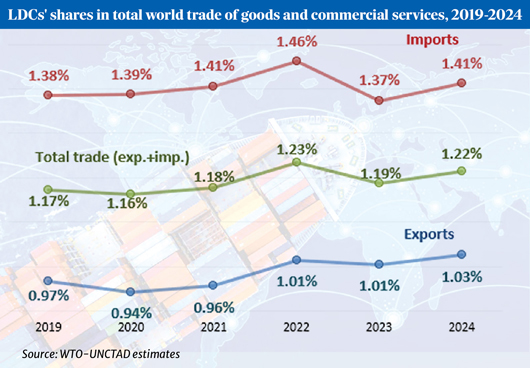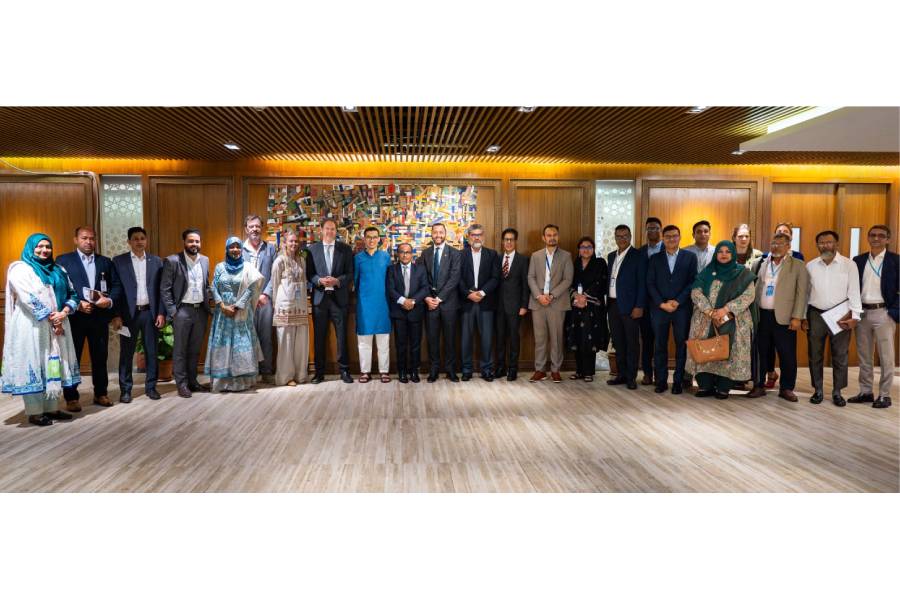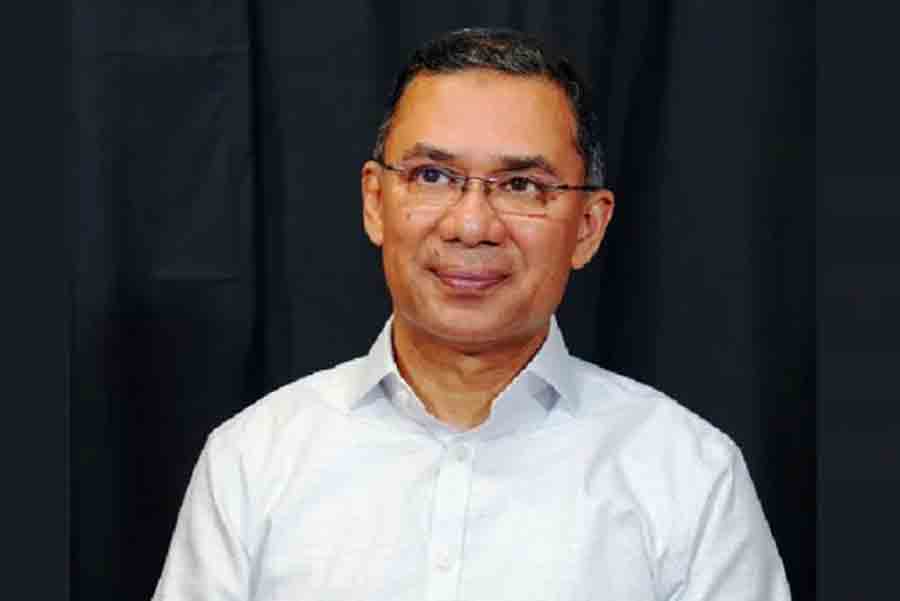Saif
Senior Member
- Joined
- Jan 24, 2024
- Messages
- 15,574
- Reaction score
- 7,889
- Nation

- Axis Group


Setbacks LDCs are up against in global trade
For more than a decade, the global community has been working towards the goal of doubling the share of global exports from the Least Developed Countries (LDCs) to two per cent by 2020, up from one per cent a decade ago. There has been the United Nations (UN) Sustainable Development Goals (SDGs') c
Setbacks LDCs are up against in global trade
Asjadul Kibria
Published :
Nov 15, 2025 22:50

For more than a decade, the global community has been working towards the goal of doubling the share of global exports from the Least Developed Countries (LDCs) to two per cent by 2020, up from one per cent a decade ago. There has been the United Nations (UN) Sustainable Development Goals (SDGs') call to 'significantly increase the exports of developing countries, in particular with a view to doubling the least developed countries' share of global exports by 2020.' When the UN formally launched the SDGs a decade ago, in 2015, the share of LDCs in global trade was only one per cent in terms of exports. In this connection, two per cent of global exports in 2020 is determined as the indicator.
Nevertheless, a decade after setting the target and five years after the deadline, the LDCs' combined share in global trade remains below two per cent of global exports, reflecting disappointing progress. In 2024, LDCs accounted for just 1.03 per cent of global exports, up only marginally from 0.96 per cent in 2012. "These figures highlight the persistent structural barriers -- limited diversification, weak infrastructure and small productive bases -- that continue to constrain export growth in LDCs," observed the UN Trade and Development (UNCTAD) in a recent note.
A note prepared by the Secretariat of the World Trade Organisation (WTO) and submitted to the Sub-Committee on LDCs in the last month showed that between 2019 and 2024 LDCs' exports of goods and services grew at an average annual rate of 6.7 per cent. In 2024, the goods exports of LDCs increased by 5.0 per cent year-on-year. Exports of commercial services, however, registered a strong growth of 12.6 per cent. The note also mentioned that in 2024, the share of LDCs in world exports of goods and commercial services increased to 1.03 per cent, up from 1.01 per cent in 2023. LDCs' share in world imports increased to 1.41 per cent in 2024 from 1.37 per cent in 2023. Thus, the share of LDCs in total world trade of goods and commercial services increased from 1.19 per cent in 2023 to 1.22 per cent in 2024.
The target of doubling the LDCs' share in global exports in five years was ambitious. Earlier, the LDCs' share in global merchandise exports almost doubled in 15 years, from 0.6 per cent in 2000 to one per cent in 2015. The LDCs' share in global exports of commercial services also doubled within a decade, from 0.50 per cent in 2005 to 0.90 per cent in 2015.
Several factors drove the global community to set the ambitious non-binding target of doubling the LDCs' share in exports in five years. Initially, it was a commendable gesture of global cooperation under the UN SDGs framework for the five Ps: people, planet, prosperity, peace, and partnership. Second, it was presumed that the poorest nations of the world could significantly improve their socio-economic conditions by enhancing trade, especially exports. Therefore, supporting the exports of LDCs through multilateral trade benefits under the WTO umbrella will be beneficial in increasing their share in global exports. This increase in share could potentially lead to improved socio-economic conditions and a brighter future for the LDCs. Third, a persistent rise in global trade during the first two decades following the WTO's inception also widened expectations. Despite a significant drop in 2008 due to the global financial crisis, global trade surged by around fourfold between 1995 and 2014. UNCTAD-WTO estimates showed that global trade in goods and commercial services increased to $23.50 trillion in 2014 from $6 trillion in 2005 when the WTO formally came into effect.
At present, there are 44 LDCs on the United Nations (UN) list, 37 of which to date have become WTO members and six are in the process of joining the WTO as members. And 15 LDCs, both WTO members and non-members, are at the different stage of graduation.
Over the decades, developed and developing countries have offered preferential market accesses to the LDCs in various forms like duty-free quota-free access and relaxed rules of origins. The offers are made under bilateral, regional and multilateral arrangements to enhance the LDCs' exports. Australia, New Zealand, Norway and Switzerland offer 100 per cent duty-free market access to LDCs whereas Chile, the European Union (EU) and the United Kingdom (UK) offer over 99 per cent duty-free market access to LDCs. The WTO secretariat note also mentioned that duty-free coverage is 98.5 per cent for Canada and 97.8 per cent for Japan. Some other WTO members grant duty-free access to around 90 per cent or more of their tariff lines, including India, the Republic of Korea and Montenegro. In addition, Hong Kong, Macao, and Singapore grant duty-free market access to all or almost all of their tariff lines under their respective most-favoured-nation (MFN) scheme.
So far, the market access benefits have not been optimal for the LDCs mainly due to discriminatory treatment by the preference giving countries to a number of LDCs. For instance, the United States (US) offers Generalised System of Preference (GSP) for least-developed beneficiary developing countries (LDBDC) covering 82.7 per cent of tariff line as duty-free. The preferential benefit excludes apparel and clothing, cotton, fibres, footwear, dairy and other animal products. That means critical and major exportable items of LDCs are subject to higher tariff. The US also scraped the GSP for Bangladesh more than a decade ago.
The tariff blitz by the United States (US) President Donald Trump is the latest blow to the LDCs' trade. UNCTAD, in an analytical note released last month, said: "Tariffs on LDCs' exports to the US market have recently tripled -- and they are twice as high as those faced by developed countries." UNCTAD also estimated that the competitiveness of the 44 LDCs would be eroded in the market, which represents nearly 10 per cent of their exports.
Just before Trump formally took office as the President of the US in January this year, LDCs on average faced less than 10 per cent tariff in the US market. In October, the rate stood at 28.30 per cent. The average rate of applied US tariff on developed countries stood at 14.20 per cent and on developing countries (excluding China), 19.20 per cent.
In 2024, Bangladesh was the top merchandise exporter among the LDCs, covering 17 per cent of all LDCs' exports, followed by Angola, the Democratic Republic of the Congo, Cambodia, and Myanmar. Ethiopia was the largest exporter of LDCs' commercial services (17 per cent), followed by Tanzania (15 per cent), and Bangladesh (11 per cent) in the last year.
What is most alarming is that the graduating LDCs, especially in Asia, face steep surges in US tariffs. At present, four Asian countries, namely Bangladesh, Cambodia, Lao PDR, and Nepal, are on the path of graduation from the LDC category by 2030. Of these, Bangladesh, Lao and Nepal are scheduled to strip off the LDC tag in November next year. The high US tariffs have definitely made the smooth graduation difficult for these countries, posing a significant challenge to their development.
Asjadul Kibria
Published :
Nov 15, 2025 22:50
For more than a decade, the global community has been working towards the goal of doubling the share of global exports from the Least Developed Countries (LDCs) to two per cent by 2020, up from one per cent a decade ago. There has been the United Nations (UN) Sustainable Development Goals (SDGs') call to 'significantly increase the exports of developing countries, in particular with a view to doubling the least developed countries' share of global exports by 2020.' When the UN formally launched the SDGs a decade ago, in 2015, the share of LDCs in global trade was only one per cent in terms of exports. In this connection, two per cent of global exports in 2020 is determined as the indicator.
Nevertheless, a decade after setting the target and five years after the deadline, the LDCs' combined share in global trade remains below two per cent of global exports, reflecting disappointing progress. In 2024, LDCs accounted for just 1.03 per cent of global exports, up only marginally from 0.96 per cent in 2012. "These figures highlight the persistent structural barriers -- limited diversification, weak infrastructure and small productive bases -- that continue to constrain export growth in LDCs," observed the UN Trade and Development (UNCTAD) in a recent note.
A note prepared by the Secretariat of the World Trade Organisation (WTO) and submitted to the Sub-Committee on LDCs in the last month showed that between 2019 and 2024 LDCs' exports of goods and services grew at an average annual rate of 6.7 per cent. In 2024, the goods exports of LDCs increased by 5.0 per cent year-on-year. Exports of commercial services, however, registered a strong growth of 12.6 per cent. The note also mentioned that in 2024, the share of LDCs in world exports of goods and commercial services increased to 1.03 per cent, up from 1.01 per cent in 2023. LDCs' share in world imports increased to 1.41 per cent in 2024 from 1.37 per cent in 2023. Thus, the share of LDCs in total world trade of goods and commercial services increased from 1.19 per cent in 2023 to 1.22 per cent in 2024.
The target of doubling the LDCs' share in global exports in five years was ambitious. Earlier, the LDCs' share in global merchandise exports almost doubled in 15 years, from 0.6 per cent in 2000 to one per cent in 2015. The LDCs' share in global exports of commercial services also doubled within a decade, from 0.50 per cent in 2005 to 0.90 per cent in 2015.
Several factors drove the global community to set the ambitious non-binding target of doubling the LDCs' share in exports in five years. Initially, it was a commendable gesture of global cooperation under the UN SDGs framework for the five Ps: people, planet, prosperity, peace, and partnership. Second, it was presumed that the poorest nations of the world could significantly improve their socio-economic conditions by enhancing trade, especially exports. Therefore, supporting the exports of LDCs through multilateral trade benefits under the WTO umbrella will be beneficial in increasing their share in global exports. This increase in share could potentially lead to improved socio-economic conditions and a brighter future for the LDCs. Third, a persistent rise in global trade during the first two decades following the WTO's inception also widened expectations. Despite a significant drop in 2008 due to the global financial crisis, global trade surged by around fourfold between 1995 and 2014. UNCTAD-WTO estimates showed that global trade in goods and commercial services increased to $23.50 trillion in 2014 from $6 trillion in 2005 when the WTO formally came into effect.
At present, there are 44 LDCs on the United Nations (UN) list, 37 of which to date have become WTO members and six are in the process of joining the WTO as members. And 15 LDCs, both WTO members and non-members, are at the different stage of graduation.
Over the decades, developed and developing countries have offered preferential market accesses to the LDCs in various forms like duty-free quota-free access and relaxed rules of origins. The offers are made under bilateral, regional and multilateral arrangements to enhance the LDCs' exports. Australia, New Zealand, Norway and Switzerland offer 100 per cent duty-free market access to LDCs whereas Chile, the European Union (EU) and the United Kingdom (UK) offer over 99 per cent duty-free market access to LDCs. The WTO secretariat note also mentioned that duty-free coverage is 98.5 per cent for Canada and 97.8 per cent for Japan. Some other WTO members grant duty-free access to around 90 per cent or more of their tariff lines, including India, the Republic of Korea and Montenegro. In addition, Hong Kong, Macao, and Singapore grant duty-free market access to all or almost all of their tariff lines under their respective most-favoured-nation (MFN) scheme.
So far, the market access benefits have not been optimal for the LDCs mainly due to discriminatory treatment by the preference giving countries to a number of LDCs. For instance, the United States (US) offers Generalised System of Preference (GSP) for least-developed beneficiary developing countries (LDBDC) covering 82.7 per cent of tariff line as duty-free. The preferential benefit excludes apparel and clothing, cotton, fibres, footwear, dairy and other animal products. That means critical and major exportable items of LDCs are subject to higher tariff. The US also scraped the GSP for Bangladesh more than a decade ago.
The tariff blitz by the United States (US) President Donald Trump is the latest blow to the LDCs' trade. UNCTAD, in an analytical note released last month, said: "Tariffs on LDCs' exports to the US market have recently tripled -- and they are twice as high as those faced by developed countries." UNCTAD also estimated that the competitiveness of the 44 LDCs would be eroded in the market, which represents nearly 10 per cent of their exports.
Just before Trump formally took office as the President of the US in January this year, LDCs on average faced less than 10 per cent tariff in the US market. In October, the rate stood at 28.30 per cent. The average rate of applied US tariff on developed countries stood at 14.20 per cent and on developing countries (excluding China), 19.20 per cent.
In 2024, Bangladesh was the top merchandise exporter among the LDCs, covering 17 per cent of all LDCs' exports, followed by Angola, the Democratic Republic of the Congo, Cambodia, and Myanmar. Ethiopia was the largest exporter of LDCs' commercial services (17 per cent), followed by Tanzania (15 per cent), and Bangladesh (11 per cent) in the last year.
What is most alarming is that the graduating LDCs, especially in Asia, face steep surges in US tariffs. At present, four Asian countries, namely Bangladesh, Cambodia, Lao PDR, and Nepal, are on the path of graduation from the LDC category by 2030. Of these, Bangladesh, Lao and Nepal are scheduled to strip off the LDC tag in November next year. The high US tariffs have definitely made the smooth graduation difficult for these countries, posing a significant challenge to their development.





































